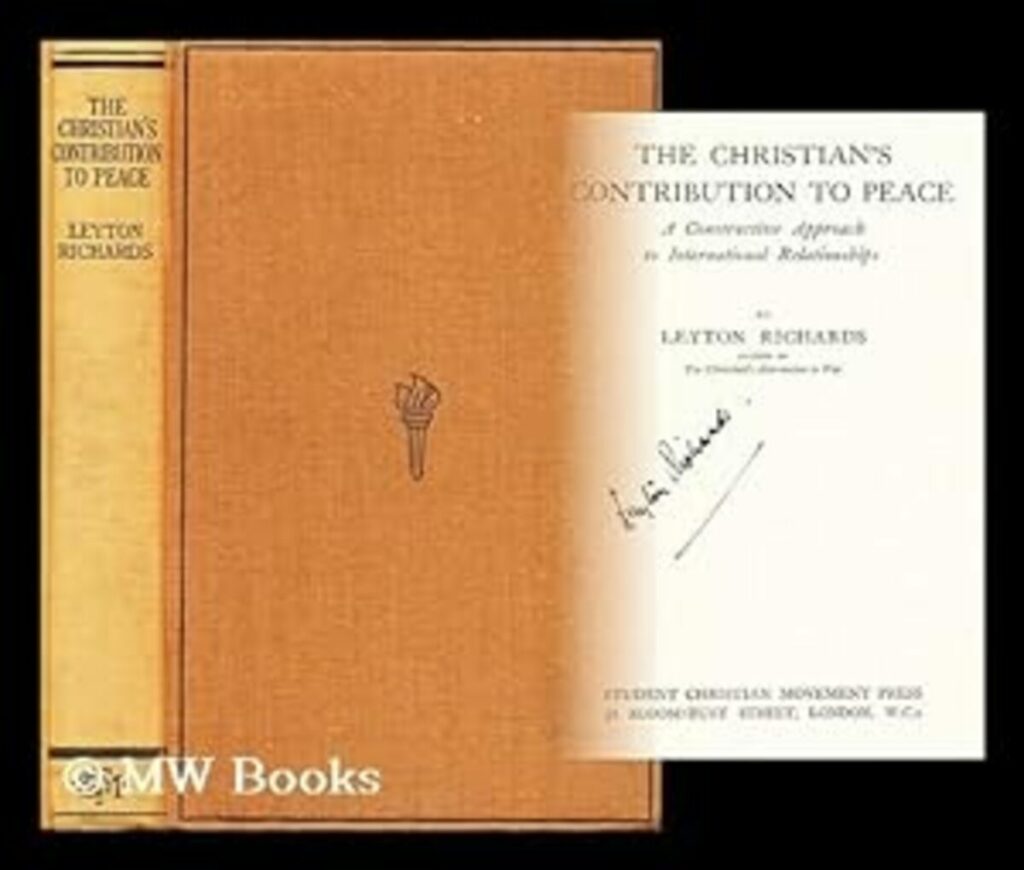
upper left. (Wikipedia)
This fall, FOR-USA began work to organize its historical volumes of Fellowship magazine, dating back to the publication’s predecessors, The New World and The World Tomorrow. First published in 1918, these magazines have been partially digitized through the dedicated work of long-time FOR leaders Douglas Mackey and Frederic Silsby. Our next steps for 2024 include identifying which volumes in FOR’s collection still need to be digitized and to populate an internal database where these materials can be easily searched by FOR staff members. By drawing inspiration from the past, we hope to contextualize and inform how FOR engages with issues of peace and social justice in the present.
This new column series, “From Our Archives,” will feature a curated collection of articles from previous Fellowship volumes, connected with contemporary issues and often republished for the first time in years. These accounts will appear as a window into the nonviolent dialogue unfolding across eras, often outmoded in their terminology, but offering salient background and insight nevertheless. We hope that these profound voices of conscience will similarly inspire you and illustrate how, in Rev. Dr. Martin Luther King, Jr.’s famous words, “the arc of the moral universe is long, but it bends toward justice.”
– Erica Fugger, Archivist, Fellowship of Reconciliation-USA
Disclaimer: The articles published in this series do not reflect the current views of the Fellowship of Reconciliation-USA and are the sole opinions of the authors expressed at the original time of their publication. Sometimes challenging in their expression and assumptions, they should be understood as unedited historical sources.
Police versus military
Originally published in The World Tomorrow, April 1925
“When is an army not an army? When it is a police force.” This variant upon the familiar conundrum suggests a common confusion in men’s minds, and with a great many good idealists this confusion serves to justify military methods. It is, for instance, on the plea of policing some of the less ordered areas of the earth that military expeditions are justified in Mesopotamia or parts of Africa, or that the despatch of a fleet of battleships is allowed to a Mexican or Persian port. Furthermore, it is under this plea of police action that the League of Nations seeks a sanction for applying economic or military pressure on recalcitrant nations.
Yet there are certain obvious and superficial differences between military and police action which ought to strike any intelligent observer. The function of an army is to fight and in certain circumstances that may be alleged in regard to the police; but no one ever heard of police forces being marshaled one against the other in order to give battle.
Even though on occasion the policeman is armed, his arms are never directed against his fellow policeman in another city or another state. Moreover, the efficiency or magnitude of the police force in one city does not necessarily stimulate other cities to competition in defense measures. But it is exactly otherwise with the armaments which are miscalled national police: in the international world, the building of a battleship by one nation is invariably a challenge for other nations to do likewise; and so there inevitably emerges that competition in armaments which is one of the factors in the creation of war. For “this wealth of ships and guns inflames the vulgar And makes the very war it guards against.”
Another obvious distinction between the army and the police is that the latter deals directly with the lawbreaker or wrongdoer, and always without deliberate or intentional injury to the innocent citizen who may be at hand. It is however, and always has been, one of the ironies of war that the chief culprits escape the retribution which poetic justice would bring upon them and, instead, even become the heroes of their people and the belauded figures in national history.
When an army fights, its shells and bullets and poison gas fall indiscriminately upon good and bad, innocent and guilty, alike: the army deals with the enemy en masse; the police deal with him individually. So also the police in endeavoring to restrain or apprehend the wrongdoer are merely the agents of an impartial judicial authority and are themselves amenable to that authority should they, in the discharge of their duty, violate any of the laws under which they act. An army, however, works under no recognized code of laws; or, more correctly, the law it observes is self-made and designed to suit its own requirements. The aim of military force is not to bring the enemy before an impartial court of justice, but by and of itself it acts as prosecution, judge, jury, jailer and executioner all in one: while in the process it seeks to inflict upon the enemy people the maximum of injury, harm and destruction, alike to property and to life.
It is to be observed in this connection that the articles in the Covenant of the League of Nations prescribing the sanctions to be used in case of default or offense by a recalcitrant power approximate to a police function, in that the sanctions are never to be applied except under the authority and by the direction of the Council of the League. It is well to recognize this as a step in advance upon the hitherto prevailing practice of competing and self-sufficient sovereignties acting through national armies; but it ought not to be confused with the true role of a police force, which differs from that of an army not only in the incidental and superficial differences already indicated, but also in certain things which are deeper and more fundamental.

These fundamental differences emerge when we judge both the military and the police systems by their ideals. If the ideal be good, then the system — though it be inadequate at present — can be progressively amended in the direction of the ideal; but if the ideal be itself intrinsically hurtful to human welfare, then no amendment of the system is possible and the effort of all good people should be directed to its extinction. So, then, as between the police ideal and the military ideal.
Ideally the police system exists not to revenge itself upon an offender, and not merely to protect society from the depredations of a wrongdoer; but to so deal with the offender that he may be returned to society as a desirable citizen. It is true that this ideal is often obscured in practice and that when it is a conscious aim, it is often expressed in an ineffective way. But the ideal is there and it is possible for any police system to develop in that direction. Such an ideal needs only to be stated in order to reveal its complete opposition to the ideal under which an army is organized and acts.
The aim of an army is not to reform the offender, but to smash him; not to return the offender to his place and position in the world, but as the Treaty of Versailles shows, to cripple his power and to rob him, so far as is possible, of opportunity to recover. From this point of view the antithesis between the two ideals can be stated in a single contrast: the police ideal is redemptive; the military ideal is destructive. This contrast is seen most acutely when we consider the actual methods by which a police force or an army operates; and again the matter may be stated antithetically: the police exist in order to protect life and property, an army functions by the destruction of life and property. Or, in other terms, the power of the police is one of the prime buttresses of a law-abiding people, while the existence of armaments threatens the very civilization which has produced them.
An army cannot persist if the whole matter be scrutinized from a Christian standpoint. The key word of the Christian system is redemption, that is the transformation of a wrongdoer into a rightdoer; and the method by which this is achieved is that of a persistent and tireless love. This love may be expressed in various ways and ought not to be confused with a mild and mushy sentimentality: it is strong and virile, daring to face any and every situation, unafraid in the presence of evil, and always moved by a passion which can never be satisfied until the sinner is brought back into fellowship alike with God and with man. To define such love is to restrict it: for it is a vital energy which cannot be indicated within the four corners of a definition: its only true expression is in terms of life, and only once in history has that expression found full realization in the person of Jesus of Nazareth. The task, therefore, of the Christian is to bring every aspect of modern life into accord with this spirit of Christ-like love. Already through the efforts and experiments of modern penologists police action is being brought into line with this Christian purpose: for more and more the police systems of civilized nations are being directed to the reformation and redemption of the wrongdoer. But while the gap between the Christian ideal and police systems is gradually being bridged, the gap between that same ideal and the military systems and activities of the nations is being rapidly widened, for modern warfare is becoming not more Christian but less so.
In its methods on the battlefield, as in its propaganda among the civilian population, the military method — both in its ideals and in its practice — is directly antagonistic to the Christian spirit. The motive moving men to take up arms may be of the highest: it was so with the idealists who, in 1914 and 1917 in Britain and America, respectively, leaped to arms for the defense of liberty. But the act of war always involves a fatal contradiction between motive and method, so that even though the aim be redemptive, the act is always destructive. It is because this fundamental contradiction is not inherent in the activities of a police force that such activities fall within the sanction of the Christian conscience, while those of an army must be forever barred.

